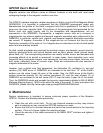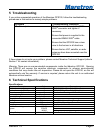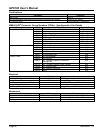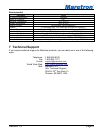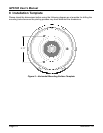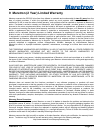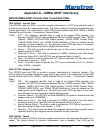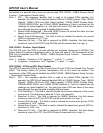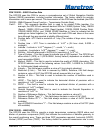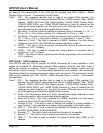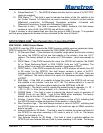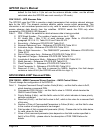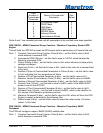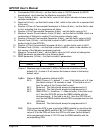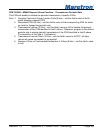
GPS100 User’s Manual
Page A4 Appendix A – NMEA 2000
®
Interfacing Revision 1.2
per second. The transmission of this PGN can be disabled (see PGN 126208 – NMEA
Request Group Function – Transmission Periodic Rate).
Field 1: SID – The sequence identifier field is used to tie related PGNs together. For
example, the GPS100 will transmit identical SIDs for 126992 (System Time), 128259
(Speed), 129026 (COG and SOG, Rapid Update), 129029 (GNSS Position Data),
129539 (GNSS DOPs), and 129540 (GNSS Satellites in View) to indicate that the
readings are linked together (i.e., the data from each PGN was taken at the same
time although they are reported at slightly different times).
2: Set Mode – This field is used to indicate the desired mode of operation: 0 = 1D. 1 =
2D, 2 = 3D, 3 = Auto (factory default), 4-5 = Reserved, 6 = Error, 7 = Null.
3: Op Mode – This field is used to indicate the actual current mode of operation: 0 =
1D. 1 = 2D, 2 = 3D, 3 = Auto (factory default), 4-5 = Reserved, 6 = Error, 7 = Null.
4: Reserved (2 bits) – This field is reserved by NMEA; therefore, this field always
contains a value of 0x3 (the GPS100 sets all reserved bits to a logic 1)
5: HDOP – This field is used to indicate the horizontal dilution of precision with a
resolution of 1x10
-2
(unitless).
6: VDOP – This field is used to indicate the vertical dilution of precision with a
resolution of 1x10
-2
(unitless).
7: TDOP – This field is used to indicate the time dilution of precision with a resolution of
1x10
-2
(unitless).
PGN 129540 – GNSS Satellites in View
The GPS100 uses this PGN to provide the GNSS information on current satellites in view
tagged by sequence ID. Information includes PRN, elevation, azimuth, and SNR. Field 4
defines the number of satellites. Fields 5 through 11 defines the satellite number and the
information. Fields 5 through 11 are sequentially repeated for each satellite to be transmitted.
The factory default for periodic transmission rate is once per second. The transmission of this
PGN can be disabled (see PGN 126208 – NMEA Request Group Function – Transmission
Periodic Rate).
Field 1: SID – The sequence identifier field is used to tie related PGNs together. For
example, the GPS100 will transmit identical SIDs for 126992 (System Time), 128259
(Speed), 129026 (COG and SOG, Rapid Update), 129029 (GNSS Position Data),
129539 (GNSS DOPs), and 129540 (GNSS Satellites in View) to indicate that the
readings are linked together (i.e., the data from each PGN was taken at the same
time although they are reported at slightly different times).
2: Mode – This field always reads as 3 (Null), indicating that range residuals are used
to calculate position, and not calculated after the position.
3: Reserved (6 bits) – This field is reserved by NMEA; therefore, this field always
contains a value of 0x3F (the GPS100 sets all bits to a logic 1)
4: Number of SVs – This field is used to indicate the number of current satellites in
view. Fields 5-11 are repeated the number of times specified by this field’s value.
5: PRN "1" – This field is used to indicate the Satellite ID Number of the satellite (1-
32=GPS, 33-64=SBAS, 65-96=GLONASS).
6: Elevation "1" – This field is used to indicate the Elevation of the satellite.
7: Azimuth "1" – This field is used to indicate the Azimuth of the satellite.
8: SNR "1" – This field is used to indicate the Signal to Noise Ratio (SNR) of the
satellite.



